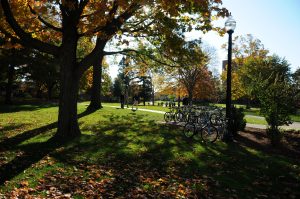It’s October! The first month of college and classes has ended, and we are moving toward midterm exams. As the director of Hope’s Counseling and Psychological Services, I wanted to take a minute of your time to address the concern of homesickness and adjusting to college. Most of our students have settled into their rooms and connected with roommates, classmates and other students around them. For some, the pull of home and the not-yet-secure connections here will make adjusting to college a little more difficult during this first month or so of college (and no, this is not just for first semester students either!).
 What can you, as families, do to best support your student? I’d like to suggest that you begin by taking a deep breath (or two, or three) and remember that your student is experiencing normal and expected grief and loss of no longer being at home. They will eventually connect with people and classes and student organizations, they will find a job on or near campus, they will even find their new favorite food in Phelps! Once they begin to connect at Hope, they will be less sad about not being home. We can all encourage students who are experiencing homesickness to be brave and take small steps to talk with other people here at Hope. Perhaps your student can set up a time to speak with their academic advisor to talk about classes? Perhaps your student could find a student club to join? Or, perhaps your student could make a coffee date with their RA?
What can you, as families, do to best support your student? I’d like to suggest that you begin by taking a deep breath (or two, or three) and remember that your student is experiencing normal and expected grief and loss of no longer being at home. They will eventually connect with people and classes and student organizations, they will find a job on or near campus, they will even find their new favorite food in Phelps! Once they begin to connect at Hope, they will be less sad about not being home. We can all encourage students who are experiencing homesickness to be brave and take small steps to talk with other people here at Hope. Perhaps your student can set up a time to speak with their academic advisor to talk about classes? Perhaps your student could find a student club to join? Or, perhaps your student could make a coffee date with their RA?
If you search online for “homesickness and college students” you will most likely read that students who are homesick must not go home to visit. Well, I happen to disagree with that as a blanket statement. Some students actually do much better after a short weekend trip home. It can be as if seeing that home is still there makes it easier to make the move to college. And, if other high school classmates are also in college and gone, the pull to home may not be a strong as they seemed those first weeks on campus.

If homesickness is making it difficult to sleep or eat or attend classes, then your student might benefit from speaking with a counselor or a chaplain. We have excellent and caring people with experience navigating the complexity of moving from home to Hope. Let us partner with your student to make good choices about how to best manage this time of transition.
Learn more at hope.edu/caps.

